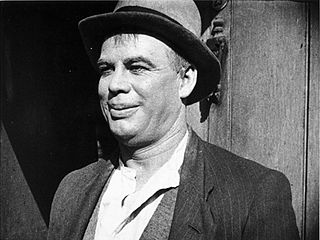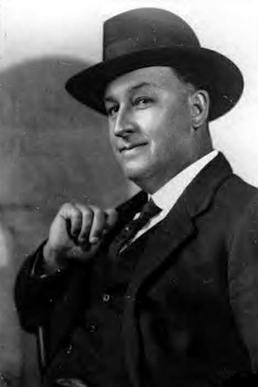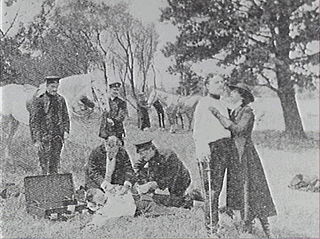Related Research Articles

The Sentimental Bloke is a 1918 Australian silent film based on the 1915 verse novel The Songs of a Sentimental Bloke by C. J. Dennis. Produced and directed by Raymond Longford, the film stars Arthur Tauchert, Gilbert Emery, and Lottie Lyell, who also co-wrote the film with Longford.
The Longford Lyell Award is a lifetime achievement award presented by the Australian Academy of Cinema and Television Arts (AACTA), a non-profit organisation whose aim is "to identify, award, promote and celebrate Australia's greatest achievements in film and television." The award is presented at the annual AACTA Awards, which hand out accolades for technical achievements in feature film, television, documentaries and short films. From 1968 to 2010, the award was presented by the Australian Film Institute (AFI), the Academy's parent organisation, at the annual Australian Film Institute Awards. When the AFI launched the Academy in 2011, it changed the annual ceremony to the AACTA Awards, with the current award being a continuum of the AFI Raymond Longford Award.

Lottie Lyell was an Australian actress, screenwriter, editor and filmmaker. She is regarded as Australia's first film star, and also contributed to the local industry during the silent era through her collaborations with director and writer Raymond Longford.

Raymond Longford was a prolific Australian film director, writer, producer and actor during the silent era. Longford was a major director of the silent film era of the Australian cinema. He formed a production team with Lottie Lyell. His contributions to Australian cinema with his ongoing collaborations with Lyell, including The Sentimental Bloke (1919) and The Blue Mountains Mystery (1921), prompted the Australian Film Institute's AFI Raymond Longford Award, inaugurated in 1968, to be named in his honour.
Arthur Embery Higgins was a pioneering Australian cinematographer known for his use of trick photography during the silent era. His ongoing collaborations with director Raymond Longford include The Sentimental Bloke (1919) and The Blue Mountains Mystery (1921). He briefly turned to directing with Odds On (1928) however returned to cinematography in 1931 for the remainder of his career.
The Fatal Wedding is a play by Theodore Kremer and a 1911 Australian silent film directed by Raymond Longford based on the melodrama, which he and Lottie Lyell had toured around Australia.

The Romantic Story of Margaret Catchpole, generally referred to as Margaret Catchpole, is a 1911 Australian silent film directed by Raymond Longford and starring Lottie Lyell. It is based on the true story of Margaret Catchpole, an adventurer and convict.
The Tide of Death is a 1912 Australian silent film directed by Raymond Longford based on an original story by Longford. This was rare at the time because most Australian silent films were based on plays or novels.

The Midnight Wedding is a 1912 Australian silent film directed by Raymond Longford based on a popular Ruritanian stage play in which Longford had appeared. It is considered a lost film.
The Silence of Dean Maitland is a 1914 Australian silent film directed by Raymond Longford. It is an adaptation of the 1886 novel of the same name by Maxwell Gray which was later filmed by Ken G. Hall in 1934. It is considered a lost film.
A Maori Maid's Love is a 1916 Australian silent film directed by Raymond Longford about an interracial romance between a white man and a Māori girl. It is considered a lost film as there are no known copies.
The Mutiny of the Bounty is a 1916 Australian-New Zealand silent film directed by Raymond Longford about the mutiny aboard HMS Bounty. It is the first known cinematic dramatisation of this story and is considered a lost film.
On Our Selection is a 1920 Australian silent film directed by Raymond Longford based on the Dad and Dave stories by Steele Rudd.
Ginger Mick is a 1920 Australian silent film directed by Raymond Longford based on The Moods of Ginger Mick by C. J. Dennis, which had sold over 70,000 copies. It is a sequel to The Sentimental Bloke (1919) and is considered a lost film.
The Dinkum Bloke is a 1923 Australian silent film directed by Raymond Longford. Despite the title and the presence of Arthur Tauchert and Lottie Lyell in the cast, the film is not a direct sequel to The Sentimental Bloke (1919) or Ginger Mick (1920).
Fisher's Ghost is a 1924 Australian silent film directed by Raymond Longford based on the legend of Fisher's Ghost. It is considered a lost film.
The Man They Could Not Hang is a 1934 Australian film directed by Raymond Longford about the life of John Babbacombe Lee, whose story had been filmed previously in 1912 and 1921.

Captain Midnight, the Bush King is a 1911 Australian silent Western film about the fictitious bushranger Captain Midnight. It was the directorial debut of actor Alfred Rolfe. The film is based on the play of same name by W. J. Lincoln and Alfred Dampier. Captain Midnight, the Bush King is now considered lost.
The Life of Rufus Dawes is a 1911 Australian silent film based on Alfred Dampier's stage adaptation of the 1874 novel For the Term of His Natural Life produced by Charles Cozens Spencer.
Arthur William Sterry (1883–1944) was an Australian filmmaker, actor and theatrical entrepreneur. He was born in Collingwood, Victoria and his family moved to Wagga Wagga when he was young. At the age of 18 Sterry moved to Melbourne. He went to work for J. C. Williamson Ltd for a time and ended up establishing his own drama company, Arthur W Sterry's Dramatic Company. He later went to work for the theatrical entrepreneur Philip Lytton, performing in a number of shows including The Waybacks.
References
- ↑ "Family Notices". The Sydney Morning Herald . 26 November 1949. p. 40. Retrieved 7 December 2012.
- ↑ "Arthur William Sterry: Actor, Film Director (1883-1944)." Sterry World-wide: A One Name Study – online
- ↑ Vagg, Stephen (29 September 2019). "Ten Stories About Australian Screenwriters You Might Not Know". Filmink.
- ↑ "Philip Lyttom Biography at Australian Variety Theatre Archive. Retrieved 24 March 2013.
- ↑ "DRAMATIC COMPANY ON TRAIN". The Sydney Morning Herald . 10 June 1925. p. 13. Retrieved 11 January 2012.
- ↑ "Philip Lyttom Biography at Australian Variety Theatre Archive. Retrieved 24 March 2013.
- ↑ "THE SORLIE SHOW". The Morning Bulletin . Rockhampton, Qld. 2 June 1950. p. 4. Retrieved 11 January 2012.